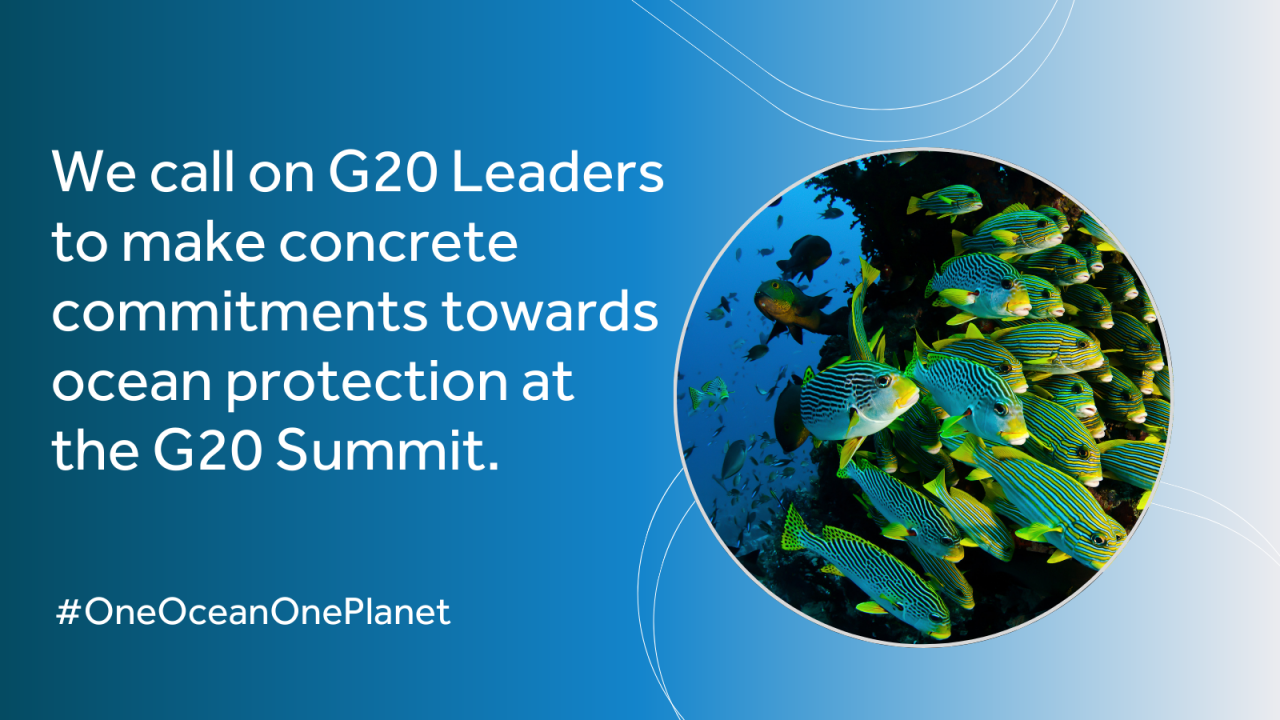The ocean community is calling on G20 leaders to listen to both science and their citizens and recognize the critical importance of a healthy global ocean and resilient marine ecosystems to address climate change and sand biodiversity loss to protect life on our planet.
We therefore call on G20 Leaders to make concrete commitments towards ocean protection at the Summit.
The letter, signed by more than 15 organisations from across the world, addresses Heads of States and governments from G20 countries ahead of the G20 Leaders Summit meeting on September 9-10, 2023, and calls on them to make concrete commitments towards ocean protection at the Summit in New Delhi, India.
The letter includes four calls to action:
- Reaffirm commitment to 2022 CBD COP15 (30×30)
- Ratification and Implementation of High Seas Treaty
- Deep Sea Protection (stopping bottom trawling on seamounts and deep-sea mining)
- Designation of MPAs in Antarctica

Dear G20 Leader,
Ahead of the G20 Leaders’ Summit 2023 on 9-10 September, we are united in urging you to prioritize ocean action and protection as part of the Summit.
All G20 governments need to listen to both science and their citizens and recognize the critical importance of a healthy global ocean and resilient marine ecosystems to address climate change and sand biodiversity loss to protect life on our planet. We therefore call on G20 Leaders to make concrete commitments towards ocean protection at the Summit.
Firstly, it is vital that G20 countries reaffirm their commitment and begin taking proactive steps to achieve the recently agreed Kunming-Montreal Biodiversity Target to protect at least 30% of the ocean by 2030 (the 30×30 target) through marine protected areas that meet IUCN standards for protected areas and are effectively managed. . This target also Includes the sustainable management of the remaining 70% of the ocean by 2030. With just 7 years away from 2023, It Is critical governments take concrete steps today.
Secondly, G20 countries must support the ratification and implementation of the landmark new ‘High Seas Treaty’ to ensure the conservation and sustainable use of marine biological diversity of areas beyond national jurisdiction. Following the historic agreement over this legally binding instrument on 4 March 2023 and adoption of the agreement on 19 June 2023, it is now critical that all G20 countries commit to ratify the Treaty as soon as possible, and to work with other countries to swiftly secure the 60 ratifications needed for the Treaty to enter into force. Ideally, this should be achieved in time for the UN Ocean Conference to be held in France in June 2025. G20 members must also commit to ensuring adequate funds are available to support developing countries with the resources and capacity needed to effectively implement the Treaty. As an essential component to meeting the 30×30 target, G20members should agree to work together to support the protection of key high seas areas once the Treaty has entered into force.
Thirdly, G20 countries must look to the future and take decisive action to protect the deep ocean and the vital ecosystem services it provides, including carbon sequestration and storage. As momentum continues to grow globally from all sectors, it is imperative that all G20 countries safeguard the health of the deep sea from destructive extraction by urgently calling for a moratorium on deep-sea mining and a prohibition on bottom trawling on seamounts and other vulnerable marine ecosystems in the high seas. In addition, and in line with the precautionary principle, G20 countries must commit to taking a precautionary approach to deep-sea carbon capture and storage technologies until the environmental, social and economic risks are comprehensively understood.
Finally, we call on the G20 countries to work together to break the impasse over the designation of Marine Protected Areas (MPAs) in Antarctica’s waters through the Commission for the Conservation of Antarctic Marine Living Resources (CCAMLR), an important step towards meeting the 30×30 target and their biodiversity commitments. After years of deadlock on three Antarctic MPA Proposals – East Antarctica, the Weddell Sea and the Antarctic Peninsula, it is essential that the fourteen G20 countries that are members of CCAMLR (Argentina, Australia, Brazil, China, France, Germany, India, Italy, Japan, Republic of Korea, Russia, South Africa, the UK, and the US), as well as the EU, commit to continue working together to secure full support for designating these MPA proposals is obtained at CCAMLR this year.
Strong commitments to protect the ocean must be included both in the Summit Agenda and in the Communiqué adopted by the G20 Leaders. This will demonstrate that the G20 is ready to take the lead towards meeting global commitments to combat the climate and biodiversity crises.
We hope that your country will champion ocean protection at the G20 Summit and commit to actions vital for the health of all people and the future of our planet.
Signed,
Antarctic and Southern Ocean Coalition
Azul
Deep Sea Conservation Coalition
Ecology Africa Foundation
Gallifrey Foundation
Global Choices
Global Ocean Trust
High Seas Alliance
International Fund for Animal Welfare (IFAW)
International Programme on the State of the Ocean
Marine Conservation Institute
Nature Canada
SeaLegacy
The Ocean Project
West Coast Environmental Law
Whale and Dolphin Conservation
WILDTRUST
If you would like your organisation to be added to the letter please email travis@oceanprotect.org or complete this form before September 4, 2023.
